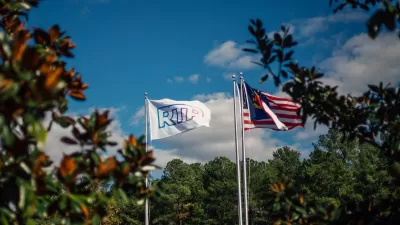The North Carolina capital is reinventing itself as a research and tech hub, attracting major employers and investment along the way.

Writing for the Commercial Observer, Celia Young reports on Raleigh, North Carolina’s explosive growth. “With high-rises sprouting throughout Raleigh’s downtown and Warehouse District, startup hubs and lab conversions transforming neighboring Durham’s former tobacco warehouses, and a burgeoning life sciences sector becoming a bigger national player amid a race for lab space, the Triangle is a ‘supernova,’ according to the latest Urban Land Institute (ULI) Emerging Trends report.”
According to Young, “The region has attracted 44,000 new jobs since the pandemic, just behind Austin and Nashville, with Wake County, where Raleigh’s located, welcoming just over 62 people a day last year.” As Young writes, “While it’s not surprising for a midsize metro in the Southeast and Sun Belt to take strides in today’s commercial real estate market, Raleigh-Durham tops peers with high educational attainment and high income in relation to housing and office costs.”
Young traces the history of Raleigh’s development as a research and tech hub. “Raleigh’s development boom, like so many things in the region, can trace part of its success back to the formation of Research Triangle Park (RTP) in 1959. A collaboration between the region’s academic powerhouses — Duke University in Durham, State University in Raleigh, and the University of North Carolina in Chapel Hill — the 7,000-acre site became a magnet for tech.”
Young points to the city’s willingness to change its zoning code as one component of its rapid growth. “Combined with the city’s Unified Development Ordinance, which consolidates zoning and other planning regulations, Raleigh’s growth policies make it relatively easy to build, and build fast, especially compared to more established markets.” Similar growth is happening in other parts of the state, which is making a concerted push to woo major companies.
FULL STORY: Raleigh Development Boom Rides Life Sciences, Tech Interest

Alabama: Trump Terminates Settlements for Black Communities Harmed By Raw Sewage
Trump deemed the landmark civil rights agreement “illegal DEI and environmental justice policy.”

Planetizen Federal Action Tracker
A weekly monitor of how Trump’s orders and actions are impacting planners and planning in America.

The 120 Year Old Tiny Home Villages That Sheltered San Francisco’s Earthquake Refugees
More than a century ago, San Francisco mobilized to house thousands of residents displaced by the 1906 earthquake. Could their strategy offer a model for the present?

Opinion: California’s SB 79 Would Improve Housing Affordability and Transit Access
A proposed bill would legalize transit-oriented development statewide.

Record Temperatures Prompt Push for Environmental Justice Bills
Nevada legislators are proposing laws that would mandate heat mitigation measures to protect residents from the impacts of extreme heat.

Downtown Pittsburgh Set to Gain 1,300 New Housing Units
Pittsburgh’s office buildings, many of which date back to the early 20th century, are prime candidates for conversion to housing.
Urban Design for Planners 1: Software Tools
This six-course series explores essential urban design concepts using open source software and equips planners with the tools they need to participate fully in the urban design process.
Planning for Universal Design
Learn the tools for implementing Universal Design in planning regulations.
Clanton & Associates, Inc.
Jessamine County Fiscal Court
Institute for Housing and Urban Development Studies (IHS)
City of Grandview
Harvard GSD Executive Education
Toledo-Lucas County Plan Commissions
Salt Lake City
NYU Wagner Graduate School of Public Service





























